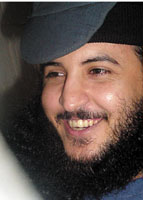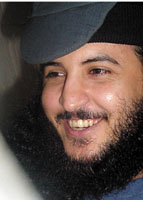
Verdict in Limburg case to be issued next February Limburg prosecutor’s deficiency exposed [Archives:2004/802/Front Page]
December 27 2004
 |
The Sana'a Counter-Terrorism Appeal Court decided Saturday, December 25 to pass the verdict against 15 al-Qaeda suspects charged with terrorism operations on February 5, 2005. The court's judge announced the decision during the hearing session that lasted for six full hours.
The unique feature of this hearing was the apparent offensive of the defendant's lawyer Abdulaziz Al-Samawi against what he called 'groundless' accusations of the prosecutors. Crowds were seen impressed in the courtroom with the degree of preciseness of the lawyer in pinpointing what seemed to be information that violated logic.
Al-Samawi said that particularly one of the prosecutor's claims is illogical. “How could have the defendants carried 1.2 tons of explosives into a container that could barely carry 250 kg?” he asked hinting the weak justifications of the prosecution.
“Those suspects are mere scapegoats and are innocent of the charges presented.” he said.
The heated debate between the prosecutor and the defendants' advocates caught the attention of the audience, who were surprised to see Al-Samawi presented to the judge a 40-page appeal containing 25 reasons for the alleged groundlessness of the preliminary verdict against his clients.
Al-Samawi strongly demanding that they should be acquitted.
He said that his clients are “victims of the US arrogance under the pretext of what is called the war on terrorism.” After a 2-hour break, the court listened to the appeals of some of the defendants including the suspected ringleader Fawaz al-Rabee who admitted his connection and relationship with al-Qaeda leader Osama Bin Laden.
Al-Rabee denied that he killed the soldier Hameed Khasroof, and hence protested the prosecution's demand to have his 10-year imprisonment sentence be intensified to death penalty. Al-Rabee and other three defendants claimed during their appeal that the confessions they made during interrogations were taken by force and that they were beaten up and tortured. Ibraheem Huwaidi said that he tried to commit suicide twice due to the psychological pressure and torture he faced at the intelligence prison.
At the end of the hearing, Judge Saeed al-Qatta decided that the verdict would be pronounced on February 25th, 2005.
During the earlier appeal hearings, the prosecution presented the evidences that made it appeal the primary court verdict and demand intensification of the jail sentence to death penalty against some of the suspects. The prosecutor said that the law does not differentiate between those people who forge official documents to hide from security or for any other reasons. He also said that the suspects' claim that their plan to assassinate the US ambassador was just a mere talk does not exempt them from punishment as long as they agreed to carry out a criminal act.
The prosecution also refuted the appeals made by eight of the defendants during the last six hearings and described them as baseless. “It is not true that they made confessions under force and threat; they were completely free when giving such confessions. The primary court verdict was not based only on such confessions but on other evidences, testimonies of the witnesses, experts' reports and others,” chief prosecutor Saeed al-Akil said. He demanded the court that verdicts against all defendants be intensified, based on the evidences presented earlier as there is no reason to lessen the verdicts.
Some of the defendants expressed strong support al-Qaeda leader Osama Bin Laden during the trial sessions.
During the last hearing the director of the legal department at the US embassy in Sana'a presented a request to the court supporting the lawsuit made against the defendants and in the name of the Hunt Oil Company whose helicopter was shot by some of the tried suspects.
Defendants previously denied their involvement in these operations. They said the confessions they made were taken by force and that they were subject to beating and torture. They disclosed that they reached an agreement with cleric Hamoud al-Hittar, head of the dialogue committee with extremists, to give up their fanatic views and take the path of tolerance.
“Please help us; we do not have any devastating ideas,” Ibraheem Huawaidi told the judge while reading his appeal. He refuted all allegations made by the prosecution against him. “I do refute and deny all allegations about my involvement in an armed gang or attacking Western embassies or attempting assignation of the US embassy,” he alleged.
On his part, Kasem al-Raimi requested that the court order the prosecution to bring evidence of its charges against him. The other five defendants refused to comment on the appeal of the prosecution without having advocacy.
When the judge offered the defendants to response to the accusations in writing, they used the platform to openly send a political message saying that the trial was only to please the USA and they also denied all charges. They said that the whole trial is a mere scenario to satisfy the superpower adding that it is a shame to do so in a time 'the USA is committing massacres in Iraq and the Muslim world'.
After the hearing, which is considered one of the longest in the recent history of Yemen, some of those who attended said that the lawyers proved to a certain degree that the prosecutors lacked substantial evidence against the suspects. They also noted that lawyer Abdulaziz Al-Samawi was able to show that the prosecutor's accusations contradicted with logic. Among those contradictions was the prosecutor's claim that the defendants carried 1.2 tons of explosives in a fiberglass container that can hold a maximum of 250 kg.
The court had sentenced on August 28th one of the defendants to death while 14 others received prison terms of three to 10 years for being found guilty of forming an armed group and carrying out attacks on Yemeni and Western targets. Hizam Mujali was sentenced to death for killing a security man named Hamid Khasroof at a security checkpoint.
Omar Saeed Hasan Jarallah, Fawzi al-Wajeeh, Mohammed Saeed Ali al-Amari, Fawzi Yahia al-Hababi, and Yasser Ali Salem (tried in absentia) received ten years in jail for bombing the French Tanker Limburg. The two brothers Fawaz al-Rabee and Abu Bakr al-Rabee were sentenced to 10 years in jail.
The other five militants (Ibraheem Mohammed al-Huwaidi, Aref Saleh Ali Mujali, Mohammed Abdullah al-Dailami, Abdulghani Ali Hussein Kaifan, and Kasem Yahia al-Raimee) were sentenced to five years in prison. The two defendants, Khaled Ahmad al-Jalob and Saleem Mohammed Ali al-Dailami, were sentenced to three years in prison for falsifying documents relating to the various attacks.
____
Yemen Times staff Hassan Al-Zaidi also contributed to the report.
——
[archive-e:802-v:13-y:2004-d:2004-12-27-p:front]


